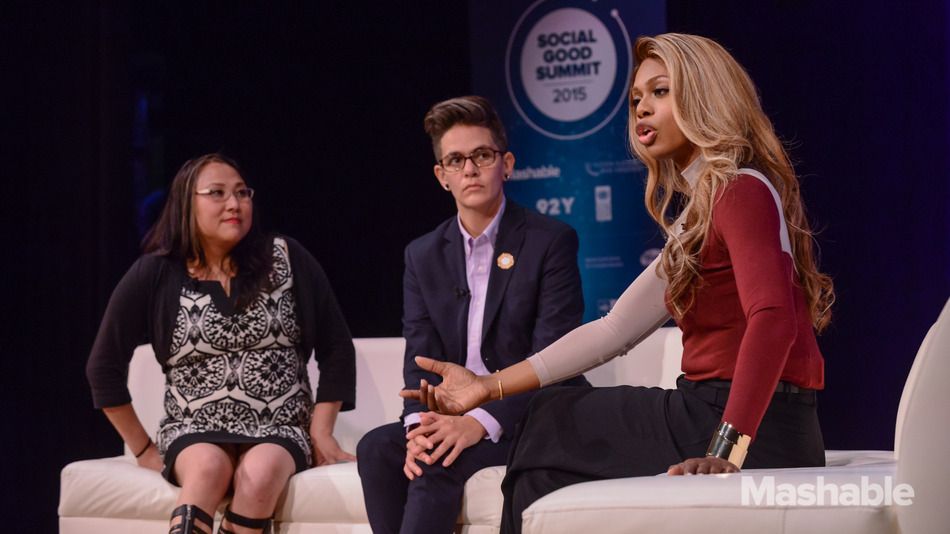If they don't count us, then we don't count

Laverne Cox appeared Monday at the Social Good Summit on a panel with Shelby Chestnut, co-director of community organizing and public advocacyat the Anti-Violence Project and Cecelia Chung, senior strategist of the Transgender Law Center.
The subject of the Census arose.
Census data has historically focused on the binary gender options: male and female. Emmy-nominated actress and transgender activist Laverne Cox is critical of that fact. The census doesn’t include her, and people like her, by assuming everyone is born into the gender they will forever identify.
I was thinking that visibility is only part of the equation. We must have social policy, systemic change. And then I thought about the census. Systemically, this idea of the gender binary is very much institutionalized in the fact that we just don't count trans people.
--Cox
What message are we sending to those who are trans and gender nonconforming when we don’t even count them? We suggest that their identities don’t even matter.--Laverne Cox
Gary Gates, a demographer at the Williams Institute at the UCLA School of Law estimated that there are 700,000 members f the transgender population. Gates admits that the number is undoubtedly flawed, since it is based on limited data from just Massachusetts and California. There have been no nationwide surveys.
The panel focused the lack of nationwide surveys like the one Gates is calling for — and the violence trans people face because of stigma of not being counted as a valuable population.
I was thinking that visibility is only part of the equation. We must have social policy, systemic change. And then I thought about the Census. Systemically, this idea of the gender binary is very much institutionalized in the fact that we just don’t count trans people.
Actually counting transgender folks is an important step in gaining a complete view of the discrimination and inequalities they face; data collection is a fundamental step to intervene in the cycle of violence.
If we really do push this Census data collection, we’ll see the systemic issues trans people are facing: housing discrimination, underemployment or employment discrimination, lack of [gender affirming] education.
--Chestnut
Our inability and unwillingness to count trans folks makes it so no one in the world right now can accurately identify the number of trans people in this nation. Chung says that in itself is a form of violence.
No one is actually acknowledging our legitimacy to exist.
In order for any government to do a better job to serve their citizens, they need to know who their citizens are.
--Chung
But there are armies of people disputing our right to exist.
The closest the government has ever come to measuring us is a May report entitled Likely Transgender Individuals in U.S. Federal Administrative Records and the 2010 Census, which tried to identify people based on the change in names people have reported to Social Security...which of course involves identifying names by gender.
So what happens when there is no data?
In 2001, Kerith Conron was working on LGBT issues in Boston’s health department. She discovered that homeless transgender people were sleeping on benches because the shelters, which were segregated by gender, didn’t know what to do with them. As a result, transgender people weren’t included in the city’s assessment of who needed shelter.
if you’re overlooked, you’re at greater risk of being underserved.
--Conron
The U.S. Census Bureau doesn’t ask who is transgender, nor do the Centers for Disease Control and Prevention. But even if they did, the responses might not be reliable because some people are afraid to answer, while others disagree on what “transgender” even means. If you see someone cite a statistic about transgender people in the United States, you’re seeing a rough estimate at best.
--Mona Chalabi, FiveThirtyEight


Comments
I once calculated my own estimate...
...of transgender frequency, but I seem to have misplaced that file.
i wonder if there would be significant under reporting...
because people might fear what the government might do with the data.
Currently, the government doesn't want to know.
Very telling points, Robyn, thanks for posting this.
That, in its essence, is fascism--ownership of government by an individual, by a group, or by any other controlling private power. -- Franklin D. Roosevelt --